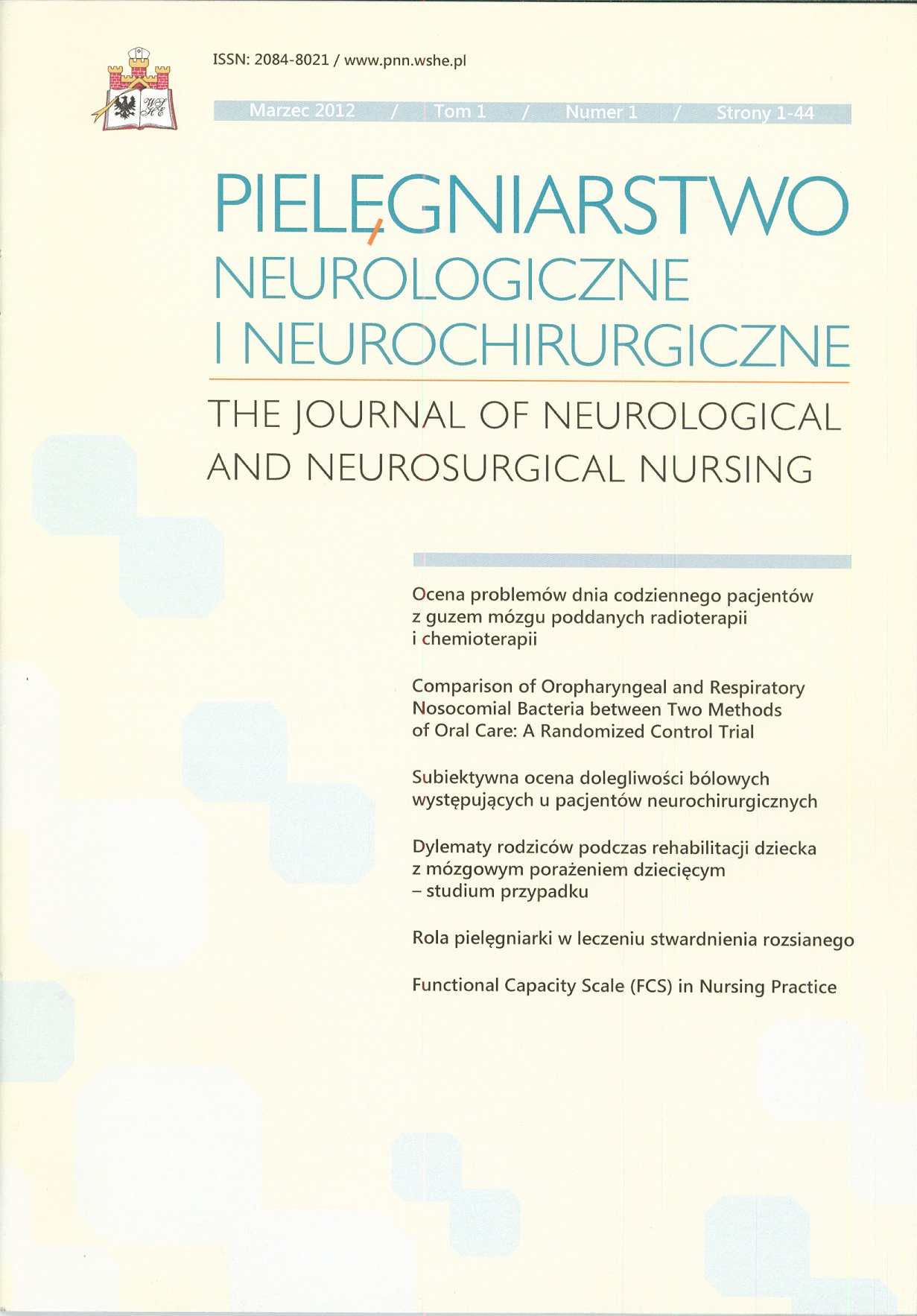Subiektywna ocena dolegliwości bólowych występujących u pacjentów neurochirurgicznych
Słowa kluczowe
ból, ból pooperacyjny, ból w neurochirurgiiAbstrakt
Wprowadzenie. Komisja Taksonomii Bólu (IASP) zdefiniowała ból jako nieprzyjemne doznanie zmysłowe i emocjonalne spowodowane uszkodzeniem lub zagrożeniem uszkodzenia tkanek, bądź odnoszone do takiego uszkodzenia.
Cel. Celem pracy było dokonanie oceny dolegliwości bólowych występujących u pacjentów neurochirurgicznych przed i po zabiegu operacyjnym. Dokonano oceny: 1) stopnia natężenie bólu u chorego przed i po zabiegu, 2) częstości występowania bólu u chorego przed i po zabiegu, 3) wpływu bólu na wydolność funkcjonalną chorego przed i po zabiegu.
Materiał i metoda. Badania przeprowadzono na Oddziale Neurochirurgii Szpitala Wojewódzkiego we Włocławku. Badaniem objęto 118 osób. W badaniach zastosowano sondaż diagnostyczny z wykorzystaniem ankiety. W celu zgromadzenia informacji dotyczących subiektywnych odczuć badanych na temat dolegliwości bólowych przed i po zabiegu operacyjnym, skonstruowano kwestionariusz ankiety. Do oceny natężenia dolegliwości bólowych przed i po zabiegu operacyjnym zastosowano zmodyfikowaną dla potrzeb badania wizualno-analogową skalą bólu Visual Analogue Scale (VAS). Do oceny częstości występowania bólu zastosowano skale Verbal Rating Scale (VRS), natomiast do oceny wydolności funkcjonalnej chorego przed i po zabiegu operacyjnym zastosowano Skale Wydolności Funkcjonalnej (SWF).
Wyniki. Zaobserwowano różnice istotne statystycznie w natężeniu dolegliwości bólowych przed i po zabiegu operacyjnym (p<0.05), w częstości występowania bólu przed i po zabiegu (p<0.05) oraz wpływu dolegliwości bólowych na wydolność funkcjonalną chorego przed i po zabiegu operacyjnym (p<0.05).
Wnioski. Stopień natężenia dolegliwości bólowych przed zabiegiem operacyjnym był znacznie większy w porównaniu z okresem po zabiegu. Dolegliwości bólowe występowały częściej przed zabiegiem operacyjnym. Ból w istotny sposób ograniczał wydolność funkcjonalną chorego przed zabiegiem w porównaniu z okresem po zabie-
gu. (PNN 2012;1(1):19-22)
Bibliografia
Merskey H. The definition of pain. European Journal of Psychiatry. 1991;6(4):153-159.
de Walden-Gałuszko K. Psychologiczne aspekty bólu. Przewodnik Lekarza. 2001;4:58-59.
Ulatowska A., Bączyk G., Lewandowska H. Przegląd piśmiennictwa na temat bólu pooperacyjnego oraz jakości opieki pielęgniarskiej. Pielęgniarstwo Chirurgiczne i Angiologiczne. 2012;1:7-12.
Wordliczek J. Patofizjologia bólu receptorowego. Nowa Klinika. 2000;7(9):956-963.
Wordliczek J., Dobrogowski J. Patofizjologia bólu pooperacyjnego. Przegląd Lekarski. 2000;4:201-209.
Wordliczek J., Dobrogowski J. Ból po zabiegach operacyjnych. Przegląd Urologiczny. 2003;3:50-58.
Gaca M., Kokot N. Leczenie bólu pooperacyjnego. Problemy Lekarskie. 1996;3:141-152.
Jaracz K., Wdowczyk K., Górna K. Ocena jakości opieki w aspekcie bólu pooperacyjnego z zastosowaniem polskiej wersji skali klinicznych wskaźników jakości postępowania z bólem pooperacyjnym. Pielęgniarstwo Polskie. 2005;1(19):9-14.
Manniche C., Asmussen K., Lauritens B., Vinterberg H., Kreiner S., Jordan A. Low back pain rating scale: validation of a tool for assessment of low back pain. Pain. 1994;57:317-326.
Ślusarz R., Beuth W., Kasprzak H.A. Psychometryczne właściwości skali wydolności funkcjonalnej. Valetudinaria Postępy Medycyny Klinicznej i Wojskowej. 2003;3-4:100-104.
Manyande A., Berg S., Gettins D., Stanford S.C. Preoperative rehearsal of active copping imagery influences subjective and hormonal response to abdominal surgery. Psychosomatic Medicine. 1995;57:177.
Golec A., Dobrogowski J., Kokot N. Psychologiczne aspekty bólu pooperacyjnego. Przegląd Lekarski. 200;57(4):211-214.
Kalinowski J. Leczenie bólu pooperacyjnego. Klinika. 1993;6:16-18.
Weiner B. Leczenie bólów pooperacyjnych. Nowa Medycyna. 1997;4(8):26-29
Pobrania
Opublikowane
Jak cytować
Numer
Dział
Licencja

Utwór dostępny jest na licencji Creative Commons Uznanie autorstwa – Bez utworów zależnych 4.0 Międzynarodowe.
Statystyki
Liczba wyświetleń i pobrań: 413
Liczba cytowań: 0
